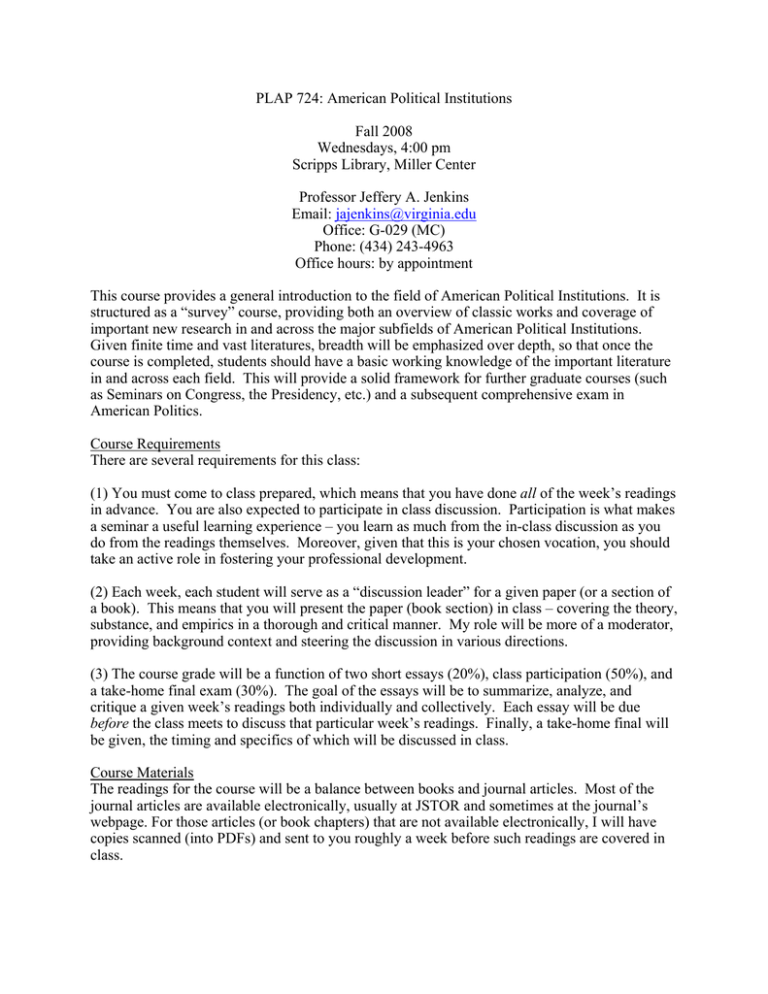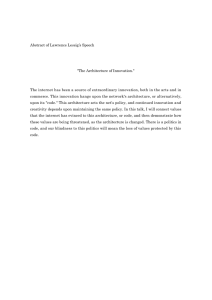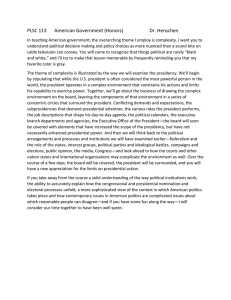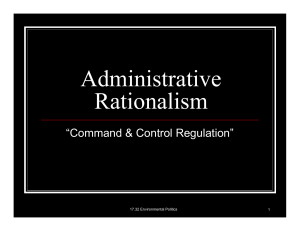PLAP 724: American Political Institutions Fall 2008 Wednesdays, 4:00 pm
advertisement

PLAP 724: American Political Institutions Fall 2008 Wednesdays, 4:00 pm Scripps Library, Miller Center Professor Jeffery A. Jenkins Email: jajenkins@virginia.edu Office: G-029 (MC) Phone: (434) 243-4963 Office hours: by appointment This course provides a general introduction to the field of American Political Institutions. It is structured as a “survey” course, providing both an overview of classic works and coverage of important new research in and across the major subfields of American Political Institutions. Given finite time and vast literatures, breadth will be emphasized over depth, so that once the course is completed, students should have a basic working knowledge of the important literature in and across each field. This will provide a solid framework for further graduate courses (such as Seminars on Congress, the Presidency, etc.) and a subsequent comprehensive exam in American Politics. Course Requirements There are several requirements for this class: (1) You must come to class prepared, which means that you have done all of the week’s readings in advance. You are also expected to participate in class discussion. Participation is what makes a seminar a useful learning experience – you learn as much from the in-class discussion as you do from the readings themselves. Moreover, given that this is your chosen vocation, you should take an active role in fostering your professional development. (2) Each week, each student will serve as a “discussion leader” for a given paper (or a section of a book). This means that you will present the paper (book section) in class – covering the theory, substance, and empirics in a thorough and critical manner. My role will be more of a moderator, providing background context and steering the discussion in various directions. (3) The course grade will be a function of two short essays (20%), class participation (50%), and a take-home final exam (30%). The goal of the essays will be to summarize, analyze, and critique a given week’s readings both individually and collectively. Each essay will be due before the class meets to discuss that particular week’s readings. Finally, a take-home final will be given, the timing and specifics of which will be discussed in class. Course Materials The readings for the course will be a balance between books and journal articles. Most of the journal articles are available electronically, usually at JSTOR and sometimes at the journal’s webpage. For those articles (or book chapters) that are not available electronically, I will have copies scanned (into PDFs) and sent to you roughly a week before such readings are covered in class. 2 We will be reading most or all of twelve books, all of which are available at the UVA Bookstore: Aldrich, John H. 1994. Why Parties?: The Origins and Transformation of Party Politics in America. Chicago: University of Chicago Press. Cameron, Charles M. 2000. Veto Bargaining: Presidents and the Politics of Negative Power. Cambridge: Cambridge University Press. Canes-Wrone, Brandice. 2006. Who Leads Whom?: Presidents, Policy, and the Public. Chicago: University of Chicago Press. Cox, Gary W., and Mathew D. McCubbins. 2005. Setting the Agenda: Responsible Party Government in the U.S. House of Representatives. Cambridge: Cambridge University Press. Epstein, David, and Sharyn O’Halloran. 1999. Delegating Powers: A Transaction Cost Politics Approach to Policy Making under Separate Powers. Cambridge: Cambridge University Press. Epstein, Lee, and Jack Knight. 1997. The Choices Justices Make. Washington: CQ Press. Howell, William H. 2003. Power without Persuasion: The Politics of Direct Presidential Action. Princeton: Princeton University Press. Krehbiel, Keith. 1991. Information and Legislative Organization. Ann Arbor: University of Michigan Press. Krehbiel, Keith. 1998. Pivotal Politics: A Theory of U.S. Lawmaking. Chicago: University of Chicago Press. Lewis, David E. 2008. The Politics of Presidential Appointments: Political Control and Bureaucratic Performance. Princeton: Princeton University Press. Mayhew, David R. 2004. Congress: The Electoral Connection, Second Edition. New Haven: Yale University Press. Mayhew, David R. 2005. Divided We Govern: Party Control, Lawmaking, and Investigations, 1946-2002, Second Edition. New Haven: Yale University Press. Below is a week-by-week list of required reading assignments: Meeting 1 (September 3): Course Overview and Introduction to Institutional Research Essays by Kenneth Shepsle, Elizabeth Sanders, and Ira Katznelson & Barry Weingast Meeting 2 (September 10): Congress I Mayhew, David R. 2004. Congress: The Electoral Connection, Second Edition. All. Rothenberg, Lawrence S., and Mitchell S. Sanders. 2000. “Severing the Electoral Connection: Shirking in the Contemporary Congress.” American Journal of Political Science 44: 316-25. Aldrich, John H., and David W. Rohde. 2001. “The Logic of Conditional Party Government: Revisiting the Electoral Connection.” In Lawrence C. Dodd and Bruce I. Oppenheimer, eds., Congress Reconsidered, Seventh Edition. Washington: CQ Press. 3 Meeting 3 (September 17): Congress II Weingast, Barry, and William Marshall. 1988. “The Industrial Organization of Congress: Or, Why Legislatures, Like Firms, Are Not Organized as Markets.” Journal of Political Economy 96: 132-63. Krehbiel, Keith. 1991. Information and Legislative Organization. All. Meeting 4 (September 24): Presidency Neustadt, Richard E. 1960 [1990]. Presidential Power and the Modern Presidents, Chapter 3. Kernell, Samuel. 1997. Going Public: New Strategies of Presidential Leadership. Washington: CQ Press. Chapters 1-3, 5. Canes-Wrone, Brandice. 2006. Who Leads Whom? All. Meeting 5 (October 1): Supreme Court Epstein, Lee, and Jack Knight. 1997. The Choices Justices Make. All. Bonneau, Chris, Thomas Hammond, Forrest Maltzman, and Paul Wahlbeck. 2007. “Agenda Control, the Median Justice, and the Majority Opinion on the U.S. Supreme Court.” American Journal of Political Science 51: 890–905. Bailey, Michael A., and Forrest Maltzman. Forthcoming. “Does Legal Doctrine Matter? Unpacking Law and Policy Preferences on the U.S. Supreme Court.” American Political Science Review. Meeting 6 (October 8): Bureaucracy Weingast, Barry R., and Mark J. Moran. 1983. “Bureaucratic Discretion or Congressional Control? Regulatory Policymaking by the Federal Trade Commission.” Journal of Political Economy 5: 765-800. McCubbins, Mathew D., and Thomas Schwartz. 1984. “Congressional Oversight Overlooked: Police Patrols Versus Fire Alarms.” American Journal of Political Science 28: 165-79. Moe, Terry M. 1985. “Control and Feedback in Economic Regulation: The Case of the NLRB.” American Political Science Review 79: 1094-116. McCubbins, Mathew D., Roger Noll, and Barry Weingast. 1987. “Administrative Procedures as Instruments of Political Control,” Journal of Law, Economics, and Organization 3: 243-77. 4 Moe, Terry. 1989. “The Politics of Bureaucratic Structure.” In John E. Chubb and Paul E. Peterson, eds., Can the Government Govern? Washington: Brookings. Meeting 7 (October 15): Political Parties Aldrich, John H. 1994. Why Parties? Chapters 1-2, 6-9. Cox, Gary W., and Mathew D. McCubbins. 2005. Setting the Agenda. Chapters 1-6. Meeting 8 (October 22): Interest Groups Olson, Mancur. 1965. The Logic of Collective Action. New Haven: Yale University Press. Sections I and II. Denzau, Arthur, and Michael Munger. 1986. “Legislators and Interest Groups: How Unorganized Interests Get Represented,” American Political Science Review 80: 86-106. Hall, Richard D., and Frank W. Wayman. 1990. “Buying Time: Moneyed Interests and the Mobilization of Bias in Congressional Committees” American Political Science Review 84: 797-820. Hojnacki, Marie. 1997. “Interest Groups’ Decisions to Join Alliances or Work Alone.” American Journal of Political Science 41: 67-87. Hojnacki, Marie, and David Kimball. 1998. “Organized Interests and the Decision of Whom to Lobby in Congress.” American Political Science Review 92: 775-90. Meeting 9 (October 29): Divided Government I Mayhew, David R. 2005. Divided We Govern, Second Edition. All. Edwards, George C., III, Andrew Barrett, and Jeffrey Peake. 1997. “The Legislative Impact of Divided Government.” American Journal of Political Science 41: 54563. Binder, Sarah A. 1999. “The Dynamics of Legislative Gridlock, 1947-1996.” American Political Science Review 93: 519-33. Meeting 10 (November 5): Divided Government II Krehbiel, Keith. 1998. Pivotal Politics. All. 5 Wawro, Gregory J., and Eric Schickler. 2004. “Where’s the Pivot? Obstruction and Lawmaking in the Pre-Cloture Senate.” American Journal of Political Science 48: 758-74. Chiou Fang-Yi, and Lawrence S. Rothenberg. 2003. “When Pivotal Politics Meets Partisan Politics.” American Journal of Political Science 47: 503-22. Meeting 11 (November 12): Delegation Epstein, David, and Sharyn O’Halloran. 1999. Delegating Powers. All. Huber, John D., Charles R. Shipan, and Madelaine Pfahler. 2001. “Legislatures and Statutory Control of Bureaucracy.” American Journal of Political Science 45: 330-45. Meeting 12 (November 19): Presidential-Congressional Relations I Cameron, Charles M. 2000. Veto Bargaining. All. Groseclose, Tim, and Nolan McCarty. 2001. “The Politics of Blame: Bargaining before an Audience.” American Journal of Political Science 45: 100-19. Meeting 13 (December 3): President-Congressional Relations II Howell, William G. 2003. Power without Persuasion. All. Mayer, Kenneth R. 1999. “Executive Orders and Presidential Power.” Journal of Politics 61:445-66. Howell, William G., and Jon C. Pevehouse. 2005. “Presidents, Congress, and the Use of Force.” International Organization 59: 209-32. Meeting 14 (December 10): Presidential Appointments Lewis, David E. 2008. The Politics of Presidential Appointments. All. Moraski, Bryon J., and Charles R. Shipan. 1999. “The Politics of Supreme Court Nominations: A Theory of Institutional Constraints and Choices.” American Journal of Political Science 43: 1069-95. Binder, Sarah, and Forrest Maltzman. 2002. “Senatorial Delay in Confirming Federal Judges, 1947-1998.” American Journal of Political Science 46: 190-99.








